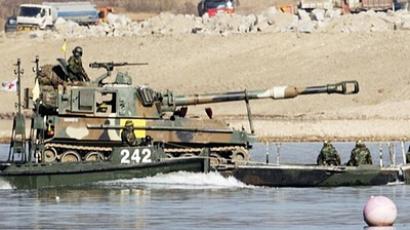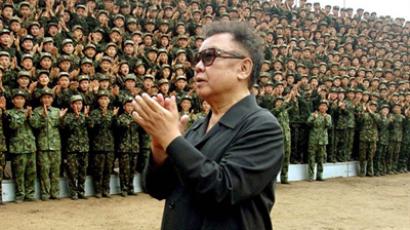'North Korea a pawn in great global game'
Amid Western fears that the death of Kim Jong-il could plunge the entire region into deeper instability, international consultant and author Adrian Salbuchi told RT that what’s really at stake is the West’s drive for global dominance.
Following South Korean media reports that North Korea carried out a ballistic missile test on Monday, Salbuchi told RT that reports that South Korea’s military is on high alert are misleading. “They talk about South Korea being on military alert. It’s not South Korea that’s on military alert – it’s the United States that’s actually been using South Korea as a beach-head since the end of the Korean War. We should really be asking ourselves if the North Korean military, which is very powerful with a one-million-strong army and four million in reserve, nuclear arms, ballistic missiles – will they really be subordinated to the new government, or will they have a larger stance in this?”Moreover, Salbuchi argues that fears of destabilization will ultimately be mitigated by China. “I cannot see any destabilization, because North Korea will not do that which China does not allow. We have to interpret North Korea within the scope of the regional geopolitics of China itself, which is the key power in the region.”Salbuchi continued that while relations between China and North Korea are complicated, North Korea is a valuable tool for the rising global power.“China has a very special relationship with North Korea. It’s sort of a love-hate, strict father vs. problems child sort of relationship. But as I said, North Korea is to China a sort of a wild card, just as Israel is a wild card to the United States.” However, despite fears regarding Pyongyang’s nuclear ambitions, Salbuchi says North Korea is just a pawn in a much larger geopolitical game. “What’s at stake for the West as a whole is how China will consolidate its power. You see, there is a grand geopolitical difference between the West and China. The West, basically the United States, Britain and its allies want global, imperial dominance. The Chinese do not want to be a dominant power globally. They want to be the dominant power regionally, in Asia and the Pacific area." Adding that one cannot understand the present-day situation in Asia outside of the context of Japanese imperialism in the 20th century, Salbuchi says that while Japan will play-act as “a spokesman for the West,” China will call the shots. Ultimately, Salbuchi says, the West will approach North Korea with caution this time around, as previous attempts at sabre-rattling only further militarized the reclusive state. “I think that the US and the UK will be very careful with what they do. Even the Democrats have tried to approach North Korea. Madeline Albright visited in 2000, Bill Clinton in 2009. But the Republicans, as we all remember in 2002, George Bush baptized North Korea as part of the ‘axis of evil’ and an outpost of tyranny, which is basically just a lot of empty words.”
Eric Sirotkin, Co-Founder of the National Campaign to End the Korean War, told RT that there is definitely going to be concern amongst North Koreans about outside interference, but the better way to respond to that is with compassion, not saber-rattling.“The Korean War ended with an armistice in 1953, but no peace treaty, so we’ve essentially just promised to stop shooting on both sides. They take it very seriously in the North and US have over 80 military bases and 20,000 troops in South Korea,” Sirotkin said. “There’s concern always about that in the North after years and years of being on the edge of war. I really see it’s an opportunity if we can respond with some compassion, deal with the food issues and go heavily into engagement, not play the sitting game, pretending that the regime is just going to collapse shortly. Then we can use this opportunity to build bridges rather than bomb them.”“2012 is the year for peace in North Korea and we should seize that opportunity. It’s the hundredth birthday celebration of Kim Il-Sung and they’ve promised peace and prosperity in 2012. This is a door that is open right now.”














